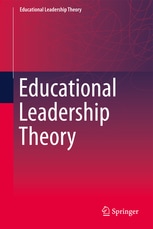
Edited by Scott Eacott and Richard Niesche
The Educational Leadership Theory book series (Springer) provides a forum for internationally renowned and emerging scholars whose ongoing scholarship is seriously and consequentially engaged in theoretical and methodological developments in educational leadership, management and administration. Its primary aim is to deliver an innovative and provocative dialogue whose coherence comes not from the adoption of a single paradigmatic lens bur rather in an engagement with the theoretical and methodological preliminaries of scholarship. Importantly, Educational Leadership Theory is not a critique of the field – something that is already too frequent – instead, attention is devoted to sketching possible alternatives for advancing scholarship. The choice of the plural 'alternatives' is deliberate, and its use is to evoke the message that there is more than one way to advance knowledge. The books published inEducational Leadership Theory come from scholars working at the forefront of contemporary thought and analysis in educational leadership, management and administration. In doing so, the contributions stimulate dialogue and debate in the interest of advancing scholarship.
For further details see http://www.springer.com/series/15484 or email Scott Eacott ([email protected]) or Richard Niesche ([email protected]).
The Educational Leadership Theory book series (Springer) provides a forum for internationally renowned and emerging scholars whose ongoing scholarship is seriously and consequentially engaged in theoretical and methodological developments in educational leadership, management and administration. Its primary aim is to deliver an innovative and provocative dialogue whose coherence comes not from the adoption of a single paradigmatic lens bur rather in an engagement with the theoretical and methodological preliminaries of scholarship. Importantly, Educational Leadership Theory is not a critique of the field – something that is already too frequent – instead, attention is devoted to sketching possible alternatives for advancing scholarship. The choice of the plural 'alternatives' is deliberate, and its use is to evoke the message that there is more than one way to advance knowledge. The books published inEducational Leadership Theory come from scholars working at the forefront of contemporary thought and analysis in educational leadership, management and administration. In doing so, the contributions stimulate dialogue and debate in the interest of advancing scholarship.
For further details see http://www.springer.com/series/15484 or email Scott Eacott ([email protected]) or Richard Niesche ([email protected]).